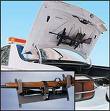
Another Stohler Letter Could Restore Oklahoma's Gun Law
Acting OSHA Assistant Secretary Thomas Stohler provided a letter to ISEA recently that may help respirator manufacturers squelch thousands of tort claims against them in state courts. Stohler sent another letter Jan. 16 that was forwarded that day by Washington, D.C., lawyer Charles J. Cooper to 10th U.S. Circuit Court of Appeals Clerk Elisabeth Shumaker. Cooper's cover letter said the Stohler letter, an OSHA "statement of agency position" that says the OSH Act's general duty clause does not preempt the Oklahoma statute barring employers from banning employees' firearms from their premises, means a federal judge's 2007 ruling that the OSH Act preempts the state law should be reversed.
The case is Ramsey Winch, Inc. v. Henry, No. 07-5166. Stohler's four-page letter was addressed to Oklahoma State Sen. Jerry Ellis, who is the principal author of the state law. Oklahoma legislators passed it in 2004 after an employer in the state fired several workers who had guns in their locked vehicles in the employee parking lot. The law says employers in the state cannot bar employees from having weapons on site in this fashion.
Oklahoma does not have an OSHA state plan, and the OSH Act preempts all state laws when a federal standard governing the same issue is in effect, Stohler wrote. "Section 18 of the OSH Act specifically preserves the states' authority to regulate 'occupational safety and health issues' with respect to which no OSHA standard is in effect. Since no OSHA standard specifically governs the issue of the presence of firearms in vehicles in company parking lots, states generally retain broad authority regarding individual rights under the Second Amendment to the Constitution, or state equivalent constitutional provisions, as they affect employers within federal OSHA's jurisdiction," he wrote. He said the Oklahoma law and a similar law passed in Florida in 2008 "do not on their face pose a conflict with the general duty clause or purpose of the OSH Act. Gun-related violence is not a recognized occupational hazard in industry as a whole, under normal working conditions. Therefore, state laws protecting an employee's right to transport and store firearms in a locked car on employer premises would not on their face impede the employer's ability to comply with the general duty clause." He said in specific cases an employer policy restricting firearms might be needed to deal with a particular threat of armed violence, and then the employer could offer preemption under the general duty clause as a defense, but "the mere possibility that random antisocial acts uncharacteristic of employment could occur is not sufficient to establish a duty."
The case has been before the 10th Circuit since November 2007. One federal judge blocked enforcement of the original Oklahoma law, which was amended in 2005 to give employers immunity if a third person used a gun from a worker's vehicle to injure or kill someone at work. A second judge, Terence Kern, blocked that law in October 2007.